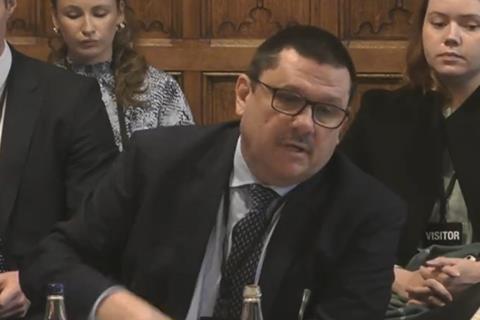Interim chair also criticises contractors’ cost-plus contracts, saying they don’t give ‘me any real levers’ for firms to improve performance
HS2 Ltd is targeting a 2030 completion date for the new high-speed rail line between west London and Birmingham, MPs have been told.
The company’s executive chairman Sir Jon Thompson revealed the internal target while giving evidence to a recall session of the public accounts committee.

Thompson was initially tight-lipped on the exact completion date, saying that they were “well within” the 2029 to 2033 range that government ministers have publicly committed to.
But later in the hearing, he said HS2 Ltd “have a month that we are trying to aim for in 2030”.
The executive chairman also used the committee meeting to criticise an investigation by the Sunday Times, which alleged that HS2 Ltd had sacked whistle-blowers and used misleading projections to keep the scheme alive.
Thompson described the article as “a disgrace” arguing that the allegations had already been investigated by the National Audit Office and the government internal audit agency and that no issues had been found.
He did admit that cost management of the project needed to be improved but lay part of the blame at the government’s door.
“The government decision to let a cost-plus contract where there are very few incentives or penalties around them, does not provide me with any real levers on those contractors to do better in relation to schedule and costs, because they receive a marginal reduction in their fee,” he said.
“If they spend 100% more than what was originally agreed, they only get a 1% reduction in their fee.”
But a recent note by broker Liberum explained the industry’s reluctance to take on the risk associated with a scheme like HS2 because of what a job of this scale could do to firms’ finances if jobs went wrong.
“The problem is that inflation, which is particularly marked in building materials, is increasing the cost of the contract,” it said. “Delays in an inflationary environment only increase the cost further. Given that the contract is essentially cost-plus, that increase in cost means an increase in price which is born almost entirely by the taxpayer. The construction industry would never have taken this open-ended risk since it simply could not have afforded the downside.”
Thompson also revealed he was told about the decision to cancel Phase 2a and 2b of the project, which would have brought high-speed rail from Birmingham to Manchester, less than 24 hours before it was announced to the country at the Conservative Party conference last month.
HS2 Ltd is expecting the cost of litigation relating to contracts agreed for the later stages of the job to be under £10m, Thompson told the committee.
He also revealed that cancellation could result in some cost rises for the remainder of the project, linked to the need to re-direct trains from HS2 track to the West Coast Mainline at Handsacre Junction.
“To be transparent about it, [we] are looking at that to work out whether [Handsacre] needs to bigger and what that means in terms of land and cost and so on and so forth,” he said.
“So, the Network North changes, there may be many that reduce the cost but there may be some that increase the cost.”
On the issue of land sales, he disputed reports that they would result in a net loss of £100m, explaining that nobody had yet calculated a figure in any detail.
“We have not currently calculated what might be the loss to the taxpayer, because you have to work through every one of the 184 properties that you have purchased in order to put a value on them,” he said.
Thompson also cautioned the committee not to expect the speedy sale initially hinted at by the government, noting that the Critchel Down rules – which enable the previous owner to buy back the land in certain circumstances – would slow the process.
He also pointed out that on Phase 2a, the secretary of state would retain compulsory purchase powers until 2026, suppressing land values and therefore potentially incentivising a later sale.
Thompson became HS2 Ltd’s chairman in February this year and become executive chairman on an interim basis last month after the departure of chief executive Mark Thurston, announced in July.
He told the committee that a head-hunter had been hired to find a new chief executive to take over early next year and that the “only outstanding issue” was the question of salary, which is still being discussed by ministers.
His recommendation to government was to change the reward structure for the role so that the next chief executive earn less in basic salary than the £622,700 Thurston was paid but with the opportunity to earn more if schedule and cost targets are met.
HS2 Ltd will also introduce a new post of chief railway officer from January, who will report directly to the new chief executive.
“One of the lessons learnt from Crossrail is you need to have a single controlling mind for the programme overall, rather than working through individual lines,” said Thompson, explaining the decision.
“You need to have someone who integrates the whole thing and integrates the railway from in-service until now.”


























No comments yet